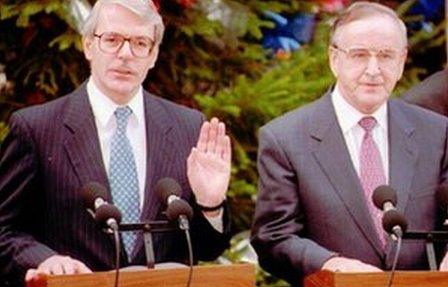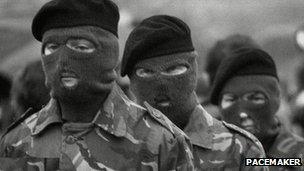Downing St Declaration: Dinner that gave birth to NI peace process
- Published

John Major and Albert Reynolds announce the Downing St Declaration on 15 December 1993
The Downing Street Declaration in December 1993 gave vital impetus to the Northern Ireland peace process. Former BBC Ireland correspondent Denis Murray assesses its importance and unlikely genesis.
John Major and Albert Reynolds were, to the outside eye, the most unlikely of political partners.
But what had happened was this: Major had become chancellor of the exchequer under the long shadow of Margaret Thatcher: Reynolds had become finance minister of the Republic of Ireland under the arguably even longer shadow of Charles Haughey, known as "The Boss".
The story goes thus: they met at an EU finance meeting, introduced themselves, and had dinner.
They agreed that if they ever got to lead their countries, they would "do something" about Northern Ireland.
Neither really expected to become leader: neither, one suspects, knew what they might "do".
So politics being a funny game, they both became prime ministers, and decided to keep their dinner agreement.
Mr Reynolds had one great gift - he was an Irish leader who knew how to speak to the British public.
"What would Irish soccer be without Jack Charlton (then the manager of the Irish national team)," he once famously asked. "And what would English soccer be without Roy Keane?"
His message was relatively simple - we have more that unites us than divides us, and there is no threat from Dublin.
Illuminated
So the two prime ministers and their staffs came up with the Downing Street Declaration.
I will never forget arriving outside No 10 that day. Downing St must be the coldest place in London - it is narrow and dark, and whatever the season, sunlight never seems to get into it.
I had been working flat out in Belfast in the lead up to the announcement, so it was only early on the morning of 15 December 1993, that I flew to London, and as usual, Downing St was freezing.
But there was this huge decorated Christmas tree behind Major and Reynolds, and, in televisual terms, it illuminated the backdrop.
The declaration did something that had never been done before - it gave the right to choose the future of Ireland to the people of Ireland as a whole (ie the Republic had a say, something Irish republicans had insisted on): but that Northern Ireland would only ever go into a united Ireland if a majority of its citizens wished it (something unionists had insisted on).
It was a clever document - not in the sense that it pleased all sides, but that it cornered all sides.
To the IRA, that is what you wanted, now face up to talking and knock off the killing: to the unionists (and the loyalist paramilitary groups) you can't say "no" to talks any more.
I arrived in Downing St in time to hear the prime ministers speak, and then go live on the BBC's One O'Clock News.
'Historic opportunity'
There had been a little over-egging in the coverage in advance of the announcement; not unreasonably after the Berlin Wall had come down, and apartheid had ended - it seemed like another problem could be solved as quickly.

The declaration was intended to produce an IRA ceasefire
But in that live broadcast, I felt I had to say the following: "Albert Reynolds has said this is a historic opportunity. Whether this declaration turns out to be a historic occasion depends on four things - this is intended to produce an IRA ceasefire; which will, in turn, produce a ceasefire by the loyalist paramilitary groups; and then will follow all-party talks, and then, hopefully, a new political agreement. And any of those will be a really good trick to pull off."
Those four things were what the declaration was intended to do. And despite all the odds against it, they all happened.
Astonishing.
Just the first of all the astonishing things that would follow, and lead to the Good Friday Agreement in 1998.
Fourteen years elapsed between the Downing St Declaration and devolution finally bedding in at Stormont in 2007.
But let us be in no doubt - without John Major and Albert Reynolds (and the risks they took), there would have been no peace process. Had there been no Downing St Declaration, there would not have been a successful peace process.
It was not the only reason the journey finished where it did; but it was the best possible place to start.
Without it, none of the rest would have followed.
- Published11 December 2013